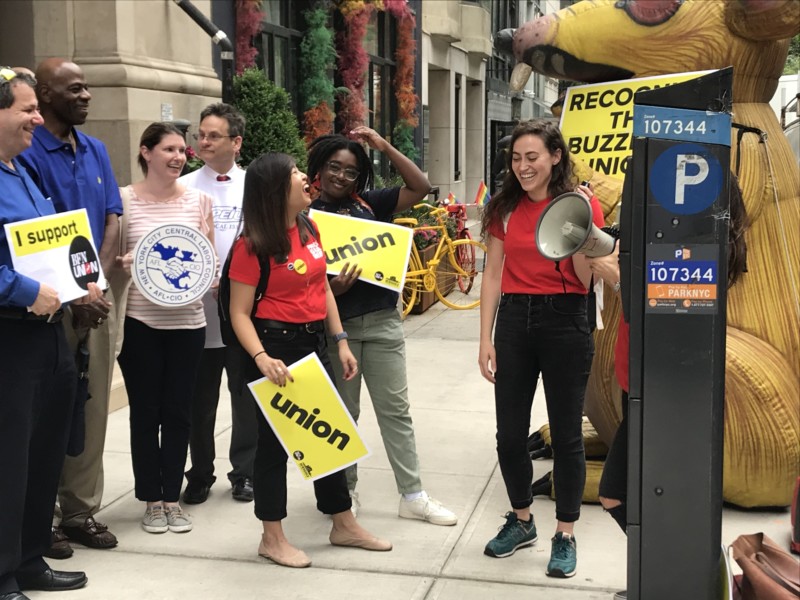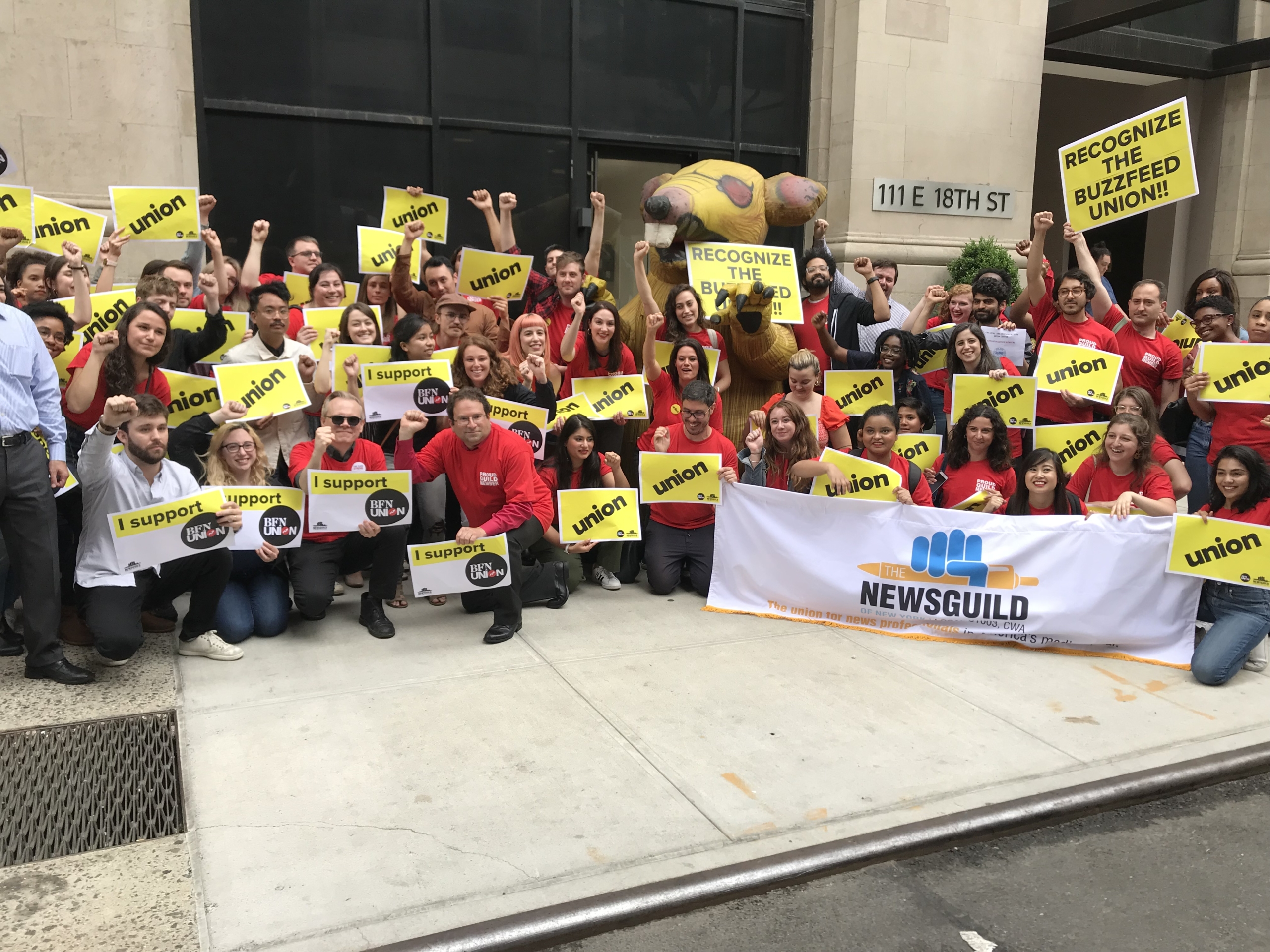Sign up for The Media Today, CJR’s daily newsletter.
Outside of BuzzFeed’s Manhattan offices on Monday, under a gray sky and occasional drops of rain, several dozen staffers of what was once the hottest news outlet on the Internet walked off their jobs. Lined up on the sidewalk along East 18th Street, they cheered and hoisted signs. “RECOGNIZE THE BUZZFEED UNION,” some read. Most, on yellow placards, read simply, “union,” in BuzzFeed’s signature script.
The New York action was accompanied by similar walkouts in Washington, D.C., Los Angeles, and San Francisco, all aimed at pressuring BuzzFeed bosses to recognize the union at a time of deep cutbacks at the company.
Dressed mostly in red NewsGuild T-shirts, the crowd was lively and animated. Passing cars honked in support, eliciting hoots and laughter. Early in the rally, about a dozen staffers from Law360, which has offices down the street from BuzzFeed’s, arrived in a show of solidarity. “Look who’s here,” somebody shouted, to claps all around. At the edge of the street sat a large, yellow-brown inflatable rat, a recognizable symbol of labor unhappiness in New York. Next to the rat was an unfortunately placed parking meter, which a couple of hapless New Yorkers actually needed to use.
From archives: BuzzFeed receives scoop from controversial source
“We are not done,” Rachel Sanders, deputy culture editor and a member of the BuzzFeed News organizing committee, said before the walkout began. “This is so important to our newsroom, and we want to show that we’re together and that we’re going to keep fighting.”
BuzzFeed’s newsroom voted to unionize in February, one month after a devastating round of layoffs that left some 200 employees of the company out of work. (“The economics of labor don’t vanish simply because we make content for the internet,” the union’s initial statement read. “The real risk to BuzzFeed News would be failing to evolve, and failing to meet the needs of its grown-up workforce.”) Jonah Peretti, BuzzFeed’s chief executive, has been explicit in the past about his opposition to a union at the company. But then came signs of hope. “We look forward to meeting with the organizers to discuss a way toward voluntarily recognizing their union,” Ben Smith, the BuzzFeed News editor in chief, said at the time.
Yet four months on, the union has not been recognized, and organizers describe negotiations with management as “often tense” and soured by bad-faith arguments. According to staffers, the standoff boils down to desires by the management to restrict who may be included in the newsroom’s bargaining unit and who may not. Specifically, management has moved to exclude employees whose contracts with the company are non-standard and to limit union membership to specific job titles—which means employees could easily be promoted, or laterally transferred, out of union membership. It also means that management could prospectively hire people under a title not covered by the union: “writer,” instead of “reporter,” for hypothetical example.
BuzzFeed management has said it needs these stipulations to allow the company to stay agile in an often-tumultuous business environment; organizers fear a ploy to limit their unit’s size and potentially to winnow its numbers—and thereby weaken the unit—over time. “The impression I’ve gotten is that management pretty explicitly wants our bargaining unit to be as small as it can be,” Sanders says.
RELATED: BuzzFeed and the digital media meltdown
As it is, staffers say they live in fear of losing their jobs at any time. “We want to focus on the work,” Davey Alba, a senior technology reporter and another union organizer says. “We want to have that question eliminated and swing for those big stories.”
Last week, Alba was the recipient of a Mirror Award—presented by Syracuse University for media reporting—for her coverage of Philippines president Rodigro Duterte’s use of social media to fuel his country’s drug war. In her acceptance speech, Alba used her platform to lament a path to recognition that had dragged on for 122 days. “The more workers band together in solidarity and the more institutions and managers we work for understand [unions] to be a way to make [our reporting] stronger and not weaker, the better off I believe media as a whole will be,” she said. She later posted a portion of her speech on Twitter, tagging Peretti and Smith.

Davey Alba and Rachel Sanders, BuzzFeed News staffers and union organizers, address the crowd. Photo by Andrew McCormick.
In an email to BuzzFeed staff on Monday in advance of the walkout, Peretti characterized the deal offered by management as fair. “Despite what you may hear to the contrary, we continue to have ongoing, daily communication between our lawyers, and we are confident the proposal provides a strong basis on which to move forward with the collective bargaining process,” Peretti wrote. Smith, reached separately for comment, referred CJR to BuzzFeed spokespeople, who sent us Peretti’s statement.
Whether or not the walkout will draw concessions from BuzzFeed management is not clear. When Vox’s editorial staff staged a similar walkout earlier this month—to win a favorable union contract—it followed more than a year of protracted contract negotiations. For BuzzFeed News, those negotiations won’t even begin until their union is recognized. That it’s come to a walkout this early in the process, staffers say, is, in a word, “disappointing.”
“That’s the word I keep coming back to,” Sanders says. “I’m really disappointed personally. This is a feeling that a lot of people in the newsroom have—that management couldn’t see this as an opportunity to be ahead of the curve on unionizing, which is something that is obviously happening across the media industry. Instead, I think they have let down their employees by making this such a hostile and drawn out process.”
As the rally continued, union representatives from other outlets showed up to offer support, including people from Reuters, The New York Times, The New Republic, and Mashable. Amid speeches and chants, two police officers arrived to complain that the rally was blocking the sidewalk. “We’ll be done in just a few minutes,” one organizer assured an officer, who in turn nodded skeptically but ultimately relented. When the rally concluded, some planned to head home, but many made their way to a nearby bar for drinks. In any case, they weren’t going back to the office. The typical work day at BuzzFeed ends at 6pm; the walkout had started at 2, and staffers intended to be absent for four hours, one hour for every month management had not recognized the union.
RELATED: BuzzFeed cuts should mean the death of metric-obsessed media
Has America ever needed a media defender more than now? Help us by joining CJR today.



